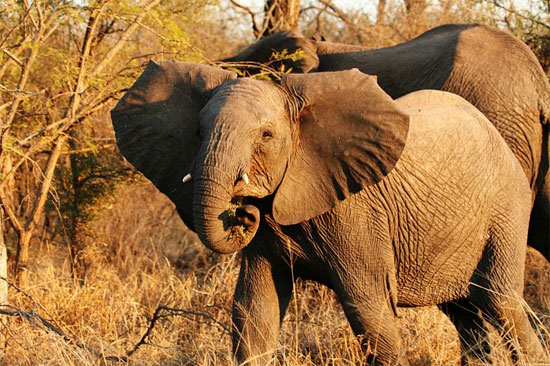African elephants work according to the moon cycle
Scientists say the elephant works depending on the moon's cycle, to avoid human detection on bright moon nights.
The study was conducted by the Anglia Ruskin University in the United Kingdom at Tanzania's Mikumi National Park in Tanzania, home to Africa's largest wild elephant population. Scientists say elephants often wait until night to eat human crops but avoid activities every morning when the moon is bright.

African elephants are considered the largest terrestrial animal on the planet.(Photo: sciencebuzz)
The area of the scientific group chosen to study is 5 villages adjacent to the park. Here villagers and experts have recorded cases of elephants attacking crops of people. The night attacks of elephants are recorded with differences in frequency and cycle. In particular, the attack and the level of damage decreased significantly during the full moon period. Elephants are species that work both day and night, but their attacks usually occur only at night to avoid the risk of being detected.
According to Rachel Grant, a professor of animal behavior at Anglia Ruskin University, the results show that elephants change behavior to reduce the risk of encountering people. By changing the cycle of activity on bright moon nights, elephants are less likely to be detected by humans and reduce the risk of being faced.
Rachel Grant added that in addition to elephants, there are many other animals that work on the moon's cycle and with varying degrees of light, which serve as part of development.
With this study, scientists will apply to learn more about other elephants outside Tanzania, and research can be applied to protect farms from the enormous damage caused by elephants. .
- African elephants are evolving into ivory because of excessive poaching
- African elephants have the first-class sensitive aces
- African elephants lose their ivory genes to avoid extinction
- Death god stalks African elephants
- Africa can clean forest elephants
- The killing of African elephants is out of control
- African elephants will decline by a fifth in the next 10 years
- 15 years later African elephants may no longer exist
- Video: Lifeguards help elephants get hit by poison
- Why is the 'giant' elephant afraid of 'tiny' ants?
- Use bees to chase elephants
- Elephants are extinct?
 Animal 'suffering' after hibernation
Animal 'suffering' after hibernation Why do goats climb well?
Why do goats climb well? Scientists were surprised to see chimpanzees eating turtles
Scientists were surprised to see chimpanzees eating turtles Giant catfish died deadly due to drought in Thailand
Giant catfish died deadly due to drought in Thailand What would happen if 200,000 African mad sparrows attacked an elephant at the same time?
What would happen if 200,000 African mad sparrows attacked an elephant at the same time?  Algae bloom kills 350 elephants in Botswana
Algae bloom kills 350 elephants in Botswana  Honeybees - 'warriors' protecting crops from elephants' destruction
Honeybees - 'warriors' protecting crops from elephants' destruction  Why did the ancient elephant Deinotherium have inverted tusks?
Why did the ancient elephant Deinotherium have inverted tusks?  What is the cause of the centuries-old feud between humans and Asian elephants?
What is the cause of the centuries-old feud between humans and Asian elephants?  What would happen if elephants in the zoo fought?
What would happen if elephants in the zoo fought? 